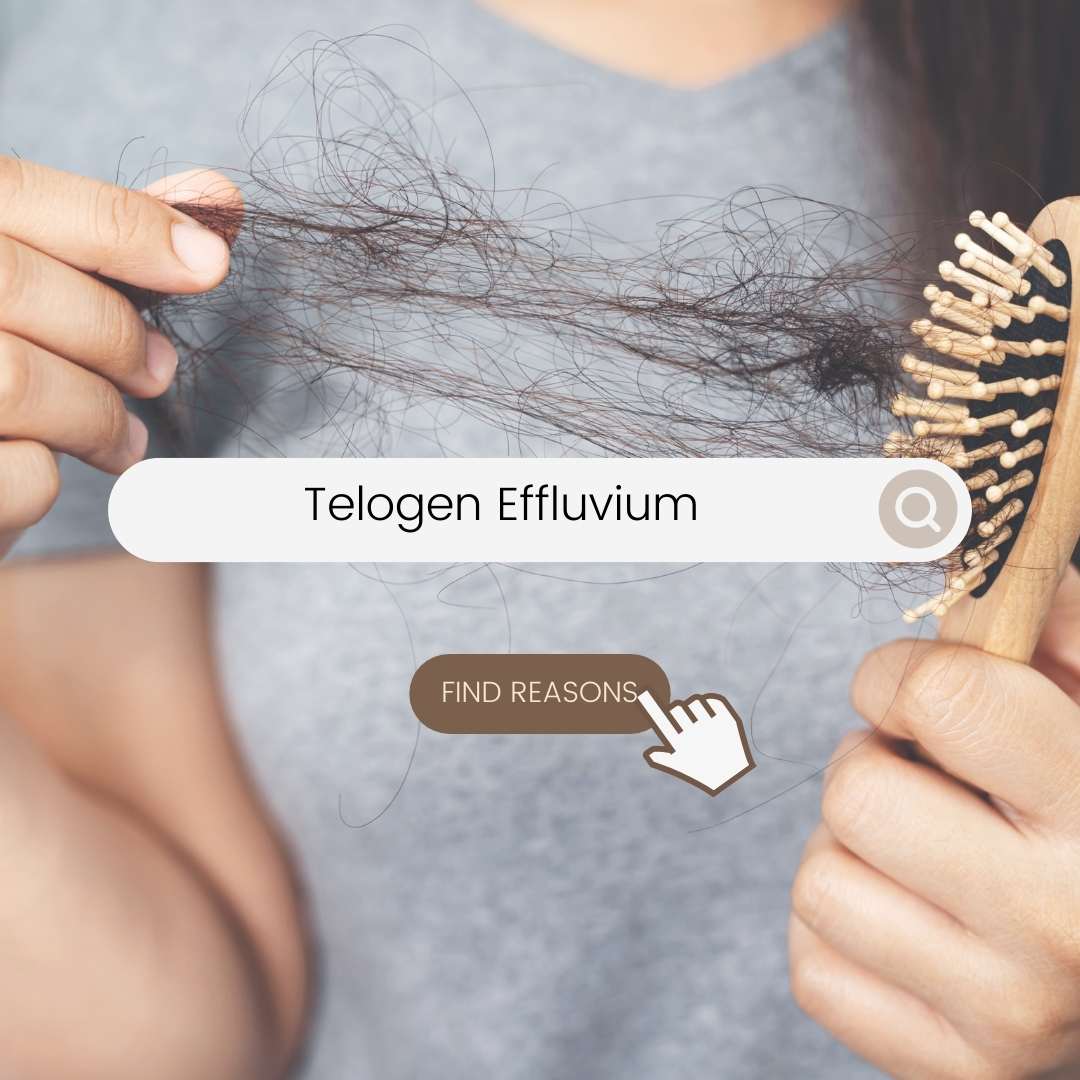Telogen Effluvium (TE) is a common but often distressing condition characterized by excessive hair shedding. It occurs when a significant number of hair follicles prematurely enter the telogen (resting) phase of the hair growth cycle. This article provides a comprehensive overview of TE, including its causes, types, diagnosis, treatment options, and coping strategies. If you are experiencing hair loss, contact our Derma Clinic Kathmandu Nepal for personalized diagnosis and treatment.
What is Telogen Effluvium?
Telogen Effluvium is a scalp disorder that leads to diffuse hair shedding. Normally, around 5% to 15% of scalp hairs are in the telogen phase, but in TE, this percentage increases significantly. Individuals with TE may lose up to 300 hairs or more daily compared to the usual 30–150 strands.
The Hair Growth Cycle
To understand TE, it’s essential to know the hair growth cycle:
| Phase | Description | Duration |
|---|---|---|
| Anagen | Active growth phase where hair grows in length. | 2–5 years (80–90% of hairs) |
| Catagen | Transitional phase where hair growth stops. | 3–6 weeks |
| Telogen | Resting phase where hairs are shed and replaced by new growth. | 3–5 months (5–15% of hairs) |
In TE, stressors disrupt this cycle, causing a large number of anagen hairs to prematurely shift into the telogen phase.
Causes and Triggers of Telogen Effluvium
Telogen Effluvium is often triggered by physiological or psychological stressors. Common triggers include:
| Category | Examples |
|---|---|
| Stress | Emotional stress, surgery, childbirth |
| Nutritional Deficiencies | Iron deficiency, low Vitamin D levels |
| Medical Conditions | Thyroid dysfunction, febrile illnesses (e.g., COVID-19, Dengue, Typhoid fever etc) |
| Medications | Chemotherapy drugs, beta-blockers |
| Hormonal Changes | Pregnancy (telogen gravidarum), menopause |
Triggers typically cause noticeable shedding about 2–3 months after the event due to the duration of the telogen phase.
Types of Telogen Effluvium
TE can be classified into two main types:
| Type | Characteristics |
|---|---|
| Acute Telogen Effluvium | Sudden onset; lasts less than six months; resolves spontaneously once the trigger is addressed. |
| Chronic Telogen Effluvium | Persistent shedding lasting over six months; common in middle-aged women; may not have a clear trigger. |
Diagnosis
Diagnosing TE involves a clinical evaluation and tests to identify underlying causes:
- Hair Pull Test: Gently pulling a small section of hair reveals excessive shedding.
- Microscopic Examination: Identifies club-shaped roots characteristic of telogen hairs.
- Blood Tests: Checks for thyroid issues, iron deficiency (ferritin levels), or other systemic conditions.
- Scalp Biopsy: Confirms an increased number of telogen-phase follicles.
- Videodermoscopy: Visualizes shorter re-growing hairs.
Treatment Options for Telogen Effluvium
Treatment focuses on addressing the underlying cause while supporting hair regrowth:
Medical Treatments:
- Iron supplements for iron deficiency.
- Low-dose oral minoxidil for chronic cases.
- Topical treatments like caffeine-based serums.
Advanced Therapies:
- Platelet-Rich Plasma (PRP) therapy combined with microneedling.
- Botulinum Toxin A injections.
- Multivitamin mesotherapy.
Lifestyle Modifications:
- Balanced diet rich in essential nutrients like biotin and zinc.
- Stress management techniques such as yoga or meditation.
- Avoiding harsh hair treatments and smoking.
Latest Advancements on Telogen Effluvium
Recent research has introduced innovative treatments for TE:
- Botulinum Toxin A: Effective in reducing hair loss with minimal sessions.
- Topical Formulations: Products containing caffeine and niacinamide have shown promising results.
- Natural Remedies: Black seed oil and trifolium extract improve scalp health and promote regrowth.
- Growth Factors: Cytokine-based treatments combined with microneedling stimulate hair follicles.
Managing Emotional Impact
Hair loss can take an emotional toll. Here are some coping strategies:
- Seek counseling or join support groups if needed.
- Practice self-care with gentle hair care routines.
- Stay reassured that most cases of TE are temporary and reversible.
Why Choose Our Derma Clinic?
At our Derma Clinic, we offer tailored solutions for Telogen Effluvium using cutting-edge diagnostic tools and advanced treatments. Whether you need nutritional guidance or innovative therapies like PRP or mesotherapy, our experts will guide you every step of the way.
Contact us today to schedule your consultation and take the first step toward restoring your hair health!

